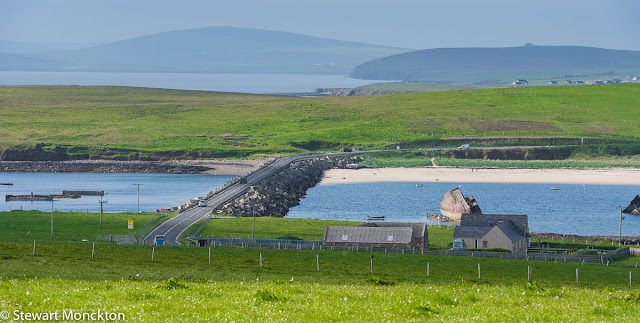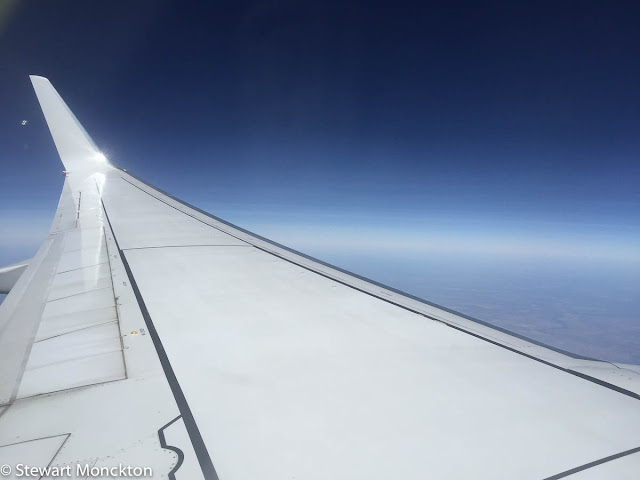Waders and wet meadows.
I woke to the sound of gulls fighting over
a fish. Possibly both herring. I lay still and let the sounds of the day
come to me. Swallows chittered softly
somewhere and house sparrows chattered to each other from the bushes in the
garden below. There was a sharp rhythmic
pinging sound as a rope slapped against a flagpole that proudly flew the flag
of Orkney. Bright sun leaked around the
edges of the blinds, even though it was only just gone 5 o’clock. Here, the tilt of the Earth brings early
mornings and late evenings; there is no midnight sun, but the days of summer
are long. Compared to the tram bustle
and traffic drone of Melbourne, such sounds are a lullaby and I quickly fall
back into sleep. Strangely, even the
morning sounds of a place I have never visited before sound more familiar than
the soundscape I have awoken to for more than 20 years. That may explain why my return to sleep was so
rapid, so predictable.
A couple of hours later I wake for
real. The gulls have gone, but the slap,
slap, slap of the rope against the flagpole remains. A breeze of varying strength will be my
companion for the next few days; an Orkney weather constant I am told. I suspect that I can also hear the whispered
conversations of the local people, saying that the sunny weather will not last,
cannot last. But it does.
After breakfast we go in search of
birds. The mainland of Orkney does not
have the abundance of wildlife of some places, but what it does have is a way
of taking you back in time, to when plenty was a given, and rarity was not the
new normal. It’s a place where you
expect, rather than just hope, to see things.
It’s a place where fields hold birds and flowers as well as grass and
cows. It’s a place where the edges are
soft and uncertain, where diversity thrives in the absence of the ruler’s edge
and the laser’s guide. Field corners and
fence posts hold surprises; owls fly unexpected over the road and flocks of
eider, hidden by the edge of the shore, take flight on wings that whistle. We hear the creaking call of a corncrake, a
bird that winters in Africa and breeds in the long summer days of
Scotland. It’s a bird ill-suited to
modernity, a bird that needs long grass and untidy corners in which to thrive. Empathy may be impossible, the mind of the
bird an unknown, but I think I know how it feels.
It is undoubtedly an illusion, but heading
to the southern islands of Orkney feels as if you are going down hill. To the north, there are tall cliffs that are
home to Fulmar and Guillemot, and a few Puffin; the people’s favourite. Rock Doves, the wild first fathers of the
urban pigeon, live in fear of Peregrine and you are never far from the sound of
wave on stone. Atop of Marwick Head a
monument to Kitchener overlooks the cold waters where he died, his boat hit by
a mine. It’s both a strange and an
appropriate place to commemorate World War One’s poster boy. The long shadow of war reaches even to these
cliffs, which seem to be haunted by more than just gulls.
The road south from the hotel takes us over
a Churchill Barrier, another intrusion from the world of war into these cold
waters. The great natural harbour of Scarpa
Flow is surrounded by Orcadian Islands, and the water the flowed between these
islands could have brought submarines to attack the great fleet sitting at
anchor. So the ways were blocked, first
with sunken ships and then, more lastingly, with barriers of stone and
concrete. The ships are fading with
time, tumbling down to rust and broken beams.
But the barriers are still there.
Where they once brought protection they now bring changes. Currents that flowed for thousands of years stopped
in a geological heartbeat and sand that was once washed away formed new beaches
on old rock. Built by Italian prisoners of
war, the barriers produced a landscape that looks more Mediterranean than
Scottish, although my experience of both is weak. In the strand line Ringed Plovers search for
food in short rushed journeys, pausing to watch us watching it, pausing between
tiny morsels of food. Their stop start
motion seems never ending, a life full of searching and uncertainty. A dog bursts from the sand dunes, all
flailing ears and disjointed limbs. This
is too much for the plovers, which take flight with sharp, ringing calls. The wind, ever present, pushes the birds
inland, over the dunes, out of sight.
The owner of the dog appears though a gap
in the dunes and the Plovers never come back.
The dog runs in the waves and bites the water in excitement. The owner takes a different approach and sits
at the dune edge and watches. The sea
brings more sand to the beach and the wind takes some away. Our footprints fill behind us, while the sand
to our front is smooth and unbroken. The
wind keeps blowing.
All hints of morning cloud have been
shifted away by the wind, and the sky is deep blue and vast. Sea smells and sounds fill the air. From the far end of the beach the laughter and
happy screams of cold-water swimmers add the only human sound. Overhead, Little Terns screech protests at
the dog and his owner, both of whom seem oblivious to the presence of the
birds. The terns are as tiny as their
name suggests, but their voices are much louder. They are flashy flyers with rolls and steep,
wing bending turns and dives. Plastic
replicas, convincingly coloured, but unconvincingly still, sit on empty nests,
presumably to encourage more authentic breeding. The real terns are too fast and too tiny for
pictures – and I suspect that the letter of the law prevents too close an
approach. These are bird for wonder and
watching; there is little need for anything else.
On the hills beyond the edge of the island,
a little further south, the view opens to show the line of the Barrier back
towards the Mainland island. The block
ship sticks from the water, broken teeth, jagged with rust. It’s only later that I find out that these
sunken ships failed in their last task – to protect the great ships of war that
sat vulnerable at anchor in Scarpa Flow.
834 men paid with their lives for that failure when the Royal Oak was
sunk by a submarine in the autumn of 1939.
In the bright sun, with the wind pushing land waves of tall grass towards
us, it is hard to believe that so much death and horror could come to a place
so far from the centre of things. Orkney
has been many things to many people, but a vision of the islands as charnel
house and slaughter field is hard to conjure.
Such things should be remembered by those who would lead us back to the
Little Europe of the past that killed its young and its best with little thought
or consequence.
The wind keeps blowing, but it seems people
do not hear the words it carries.
Down by the coast a grey farmhouse sits,
four square and firm in the lea of a small slope. Its windows are small and the porch over the
door large. This is testament to the
real weather of these islands, and the possibility that bright sun and blue
skies are far from the norm. Out to sea
a boat passes with high kicked spray. Fishing and farming. In the field across the road a Curlew sounds
its bubbling call. A hint of the old
ways in a new age.
Land and sea. Sky and sound. The past in the present, with history in the
rear view mirror as we drive away.
Heading south, looking for waders and wet meadows.
A maze of roads covers the southern end of
South Ronaldsay. Roads meet and depart
from each other for reasons which may have made sense once, but now that reason
seems to have been lost. Navigation
seems both pointless and futile; all roads lead nowhere and end up, eventually,
back at the same place. Ring roads and
farm bypasses with white lines replaced by a median strip of grasses and
weeds. In the folds of the land yellow
flowers bloom and sway. Every field
seems flanked by roads and pathways, ghosts from a time when each patch of land
had a different name and a well-known purpose.
Calving fields, lambing fields, fields that offered shelter when the
wind was from the east and fields fresh with the promise of early spring feed. People have tilled and toiled here for so
long that each and every inch of the land is known. Only old places hold such a network of
knowing. There is the strange feeling
that the roads are looking after you, guiding you back to a place that you know
– it’s a small place, a place where you may not know where you are, but in
which you never feel lost.
On a fence post a Redshank tells the world
that this is his patch and that intruders will be dealt with. Down in the mud and the long grass there must
be a nest, or huddled young ones, as dependent on the adults as the adults are
on these wet pastures. To be complete
both need the other. It’s the way things
are supposed to be. A Curlew with a
field running chick displays to lead us away, predators that we must be. A few Lapwings feed in the mud. I grew up calling this bird a peewit, a name that seems to have
slipped from usage. The name and the
places in which they breed, both pushed back into memory, recalled only by the
old and those of us who do not always accept that modernity is the same as
progress.
Down by the
shore we sit in the shelter of a stone bank, thrown by winter storms and high
tides. Behind the bank a small church,
built of rough cut stone, and haunted by the calls of Swallows, stands without
a village or congregation. The building
is old, deconsecrated and for sale. No
running water, except that which falls from the sky. No electricity. Just four low walls and a sturdy roof. As the UK prepares for isolation and America
embraces lunacy, it seems the perfect place to be. A place that, for a while at least, seems
free from the constraints of idiocy and the constriction of possibility. A family of Eider swims by the shore and a
seal bobs in the water. The air is clear
and the sky open and fresh. I wish my
family could see this place.
A few hours
later I drop my bag on to the floor of my hotel room in Glasgow. My coat smells of salt air and sunshine.
As the day
fades I hope the waders of Orkney survive the short summer night and wonder
what it would be like to return in the winter, with its daylight famine and
stormy darkness.
Barrow and
beach. Storm and stones. Waders and wet meadows. Sometimes the impact of place does not depend
on the duration of the visit. I suspect
some places will linger longer than others.
By the time
I am fully gone, I know I want to go back.










Comments
Wishing you a Delightful Week ~ ^_^
With best wishes - - Richard
Enjoy your day.